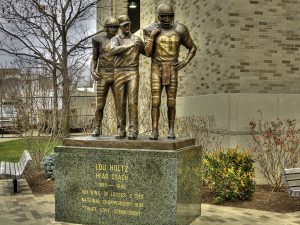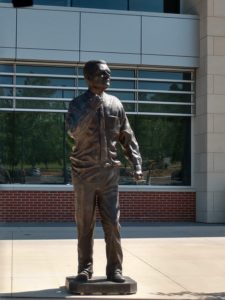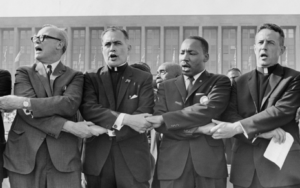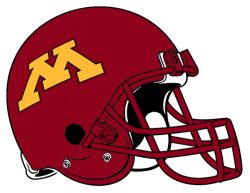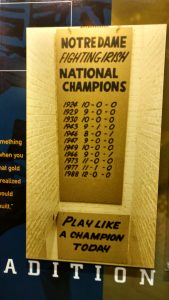With Lou Holtz being awarded the Presidential Medal of Freedom, days after the University of Notre Dame publicly distanced themselves from the man, we present Holtz’s story at ND, in three parts.
“Our faith inspires our use of reason, and our reason sharpens our understanding of faith. Together, they both serve in the search for truth…a Catholic university rejects a faith that trumps all claims of reason, and rejections a rationalism that preempts all claims of faith.
-Father John I. Jenkins
As the haze of football fades in early January, objectivity has the opportunity to reemerge for some fans, if only for an instant before the barrage of pre-season football hype.
During this moment of clarity, fans have had many chances to look beyond the winning record of Coach Holtz and learn more about his career before Notre Dame. It seems they’ve refused to do so.
When Arkansas Athletic Director Frank Broyles approached Notre Dame Sports Information Director Roger Valdiserri to advocate for the hiring of Lou Holtz, Valdiserri mentioned how strange he found the situation to be. Here was Broyles, recommending his coach to Notre Dame, despite having a record of 30-5-1 in his first three years at Arkansas.
Holtz would finish his career at Arkansas with a 60-21-2 record before Frank Broyles fired him. A coach with a winning record fired by the same man trying to convince Notre Dame to hire him?
Strange indeed.
Before joining the Arkansas staff, coach Holtz had befriended North Carolina Senator Jesse Helms. Helms was an ultraconservative senator who was leading an effort to block Martin Luther King Day from becoming a national holiday. Lou Holtz taped two commercials in support of Helms from his office at the University of Arkansas.
It is believed that this is what led to his firing.
When he took his next job at the University of Minnesota, he quickly met with Democrat Governor Rudy Perpich and said, “I’ll assure you this, I will have nothing to do with politics.” He was pretty much true to his word and essentially avoided politics while he was in Minneapolis.
However, his time as coach of the Golden Gophers was not without controversy.
After only two years in the Twin Cities, Holtz left for Notre Dame, refusing to coach the Gophers in the Independence Bowl against Clemson in order to get a head start on the Notre Dame job while also fleeing a university now implicated in an NCAA scandal.
The University of Minnesota was charged with 21 allegations of rules violations during the Holtz-era, accusing him of making three cash payments to players during his tenure as head coach. He’d later admit to having made these payments.
To remain faithful is a bittersweet practice. When rewarded, we feel vindicated, but the wait for deliverance can be interminable. As a result of this impatience, fans become idolaters, elevating any who can accelerate the road to redemption.
But, when we can interact with our idols, when we sharpen our gaze, we learn that the gilding we’ve provided has many cracks and, when touched, often crumbles to pieces in our hands.
At the age of 49, Lou Holtz had left his one-bedroom home in Pennsylvania far behind and was the head coach of one of the most storied college football programs in need of redemption. Within two years of his arrival, the Fighting Irish were national champions.
As fans, we believe it was through his core tenants of trust, love, and commitment. But it could also be the result of distributing steroids in the locker room, boosters giving players lavish gifts and free trips to Las Vegas as incentives, and academic fraud perpetrated in order to keep players eligible for games.
When Lou Holtz left the University of Notre Dame in 1996, he officially “retired,” despite rumors of his having been offered a lifetime contract.
Soon after, Notre Dame received a two-year probation from the NCAA due to violations that occurred on his watch.
In 1999, Holtz resurfaced at the University of South Carolina. However, it appeared his magic of trust, love, and commitment had worn off. When he retired for a second and now final time in 2004, he left with a 33-37 record. The NCAA imposed a three-year probation on the university for committing five major infractions during his time as a coach.
In 2011, the University of Notre Dame awarded him an honorary doctor of laws degree for leading the Irish to the 1988 national championship, achieving a high graduation rate, and performing extensive philanthropy in the region.
A degree for winning football games; possibly an indulgence given with hopes of absolving a 23-year championship drought?
For part one of the complicated story of Lou Holtz at Notre Dame go here. For part three, go here.
